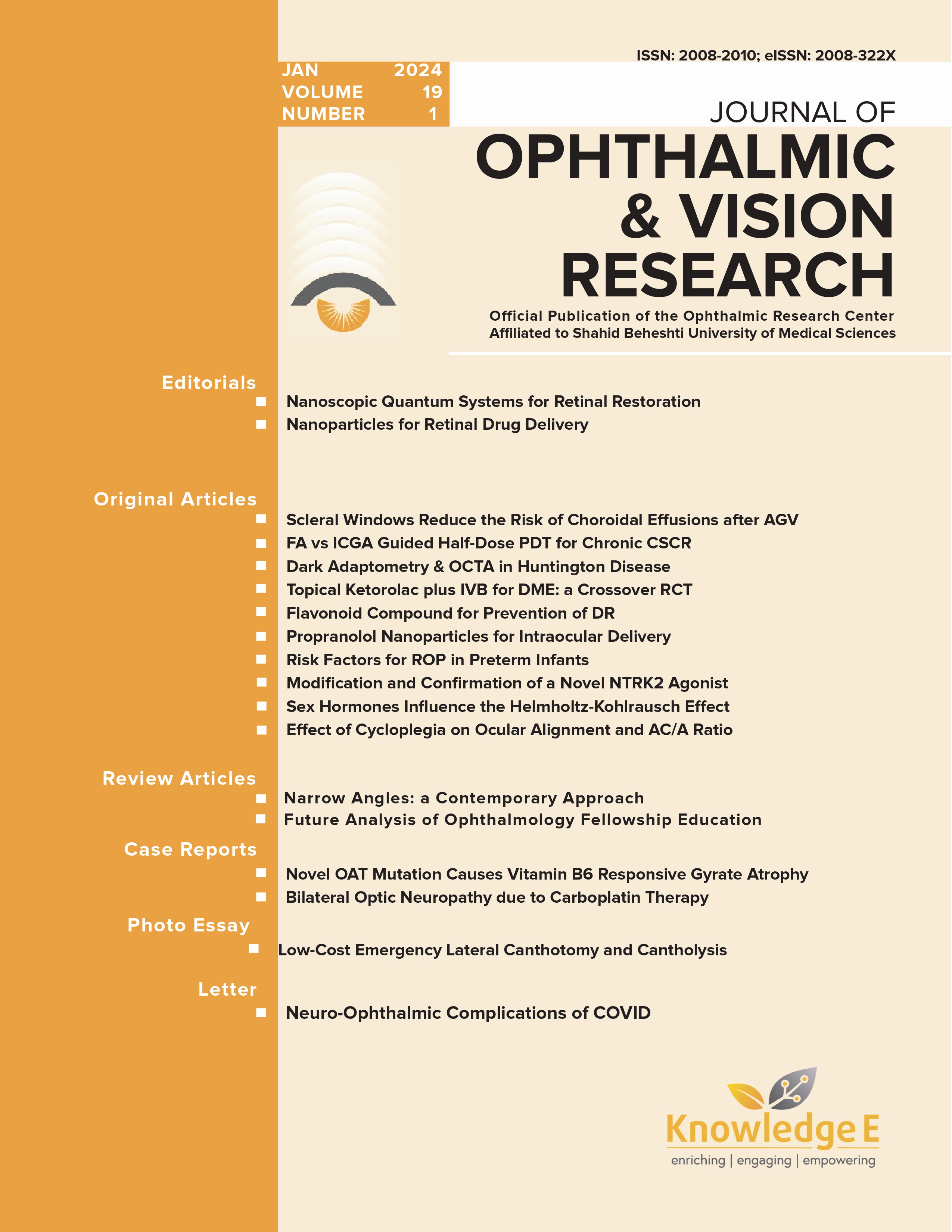Andrographis Paniculata (Burm. F.) Flavonoid Compound and Prevention of Diabetic Retinopathy
DOI:
https://doi.org/10.18502/jovr.v19i1.15435Keywords:
Andrographis paniculata, Antioxidants, Diabetic Retinopathy, Plant Extracts, Retinal VesselsAbstract
Purpose: To explore the effect of the flavonoid compounds of Andrographis paniculata by evaluating the glycemic profile, oxidative process, and inflammatory values in rats with diabetic retinopathy (DR).
Methods: An extract of A. paniculata was macerated with ethanol which yielded flavonoid compounds. Streptozotocin was utilized to induce diabetes mellitus in male Wistar rats. Vucetic’s methods were used to evaluate the retinal vessel diameters. Antioxidant parameters and inflammatory cytokines were assessed in retinal tissue.
Results: A funduscopic examination revealed some alterations in the retinal veins. In comparison to the DR group with no treatment, the diameter of the retinal vessels in the DR group that was treated with the flavonoid component of the A. paniculata extract (FAP) at doses of 20 and 40 mg/kg body weight (BW) was significantly smaller (P < 0.05), Glutathione, superoxide dismutase (SOD), and catalase levels were increased after receiving FAP at doses of 20 and 40 mg/kg BW (P < 0.05).
Conclusion: Administration of doses of 20 and 40 mg/kg BW of the A. paniculata’s flavonoid compounds improved DR in rats via retinal vessel diameter reduction, TNF-a and VEGF level reduction, and increasing antioxidants, SOD, catalase, and glutathione.
References
Mansour SE, Browning DJ, Wong K, Flynn Jr HW, Bhavsar AR. The evolving treatment of diabetic retinopathy. Clin Ophthal 2020;14:653–678. DOI: https://doi.org/10.2147/OPTH.S236637
Tarigan TJE, Yunir E, Subekti I, Pramono LA, Martina D. Profile and analysis of diabetes chronic complication in outpatient Diabetes Clinic of Cipto Mangunkusumo Hospital, Jakarta. Med J Indo 2015;24:165–170. DOI: https://doi.org/10.13181/mji.v24i3.1249
Asmat U, Abad K, Ismail K. Diabetes mellitus and oxidative stress-A concise review. Saudi Pharm J 2016;24:547–553. DOI: https://doi.org/10.1016/j.jsps.2015.03.013
Wu J, Zhong Y, Yue S, Yang K, Zhang G, Chen L, et al. Aqueous humor mediator and cytokine aberrations in diabetic retinopathy and diabetic macular edema: A systematic review and meta-analysis. Dis Markers 2019;692854. DOI: https://doi.org/10.1155/2019/6928524
Semeraro F, Cancarini A, dell’Omo R, Rezzola S, Romano MR, Costagliola C. Diabetic retinopathy: Vascular and inflammatory disease. J Diabetes Res 2015;2015:582060. DOI: https://doi.org/10.1155/2015/582060
Domenech EB, Marfany G. The relevance of oxidative stress in the pathogenesis and therapy of retinal dystrophies. Antioxidants (Basel) 2020;9:347. DOI: https://doi.org/10.3390/antiox9040347
Shaito A, Thuan DTB, Phu HT, Nguyen THD, Hasan H, Halabi S, et al. Herbal medicine for cardiovascular disease: Efficacy, mechanism and safety. Front Pharmacol 2020;422. DOI: https://doi.org/10.3389/fphar.2020.00422
Hidayat R. Cancer treatment in Islamic traditional medicine. Arkus 2021;7:155–159. DOI: https://doi.org/10.37275/arkus.v7i2.93
Karim F, Panserga EG, Saleh MI. The efficacy of combination extract Andrographis paniculata and Syzygium polyanthum on glucose uptake in skeletal muscle in diabetic rats. Bioscientia Medicina: J Biomed Translat Res 2018;2(4):39–46. DOI: https://doi.org/10.32539/bsm.v2i4.63
Nugroho AE, Andrie M, Warditiani NK, Siswanto E, Pramono S, Lukitaningsih E. Antidiabetic and antihiperlipidemic effect of Andrographis paniculata (Burm. F.) Nees and andrographolide in high-fructose-fatfed rats. Indian J Pharmacol 2012;44:377–381. DOI: https://doi.org/10.4103/0253-7613.96343
Wediasari F, Nugroho GA, Fadhilah Z, Elya B, Setiawan H, Mozef T. Hypoglicemic effect of a combined Andrographis paniculata and Caesalpinia sappan extract in streptozocin-induced diabetic rats. Adv Pharmacol Pharm Sci 2020;8856129. DOI: https://doi.org/10.1155/2020/8856129
Rocházková D, Bousová I, Wilhelmová N. Antioxidant and prooxidant properties of flavonoids. Fitoterapia. 2011;82:513–523. DOI: https://doi.org/10.1016/j.fitote.2011.01.018
Speisky H, Shahidi F, de Camargo A, Fuentes J. Revisiting the oxidation of flavonoids: Loss, conservation, enhancement of their antioxidant properties. Antioxidants 2022;11:133. DOI: https://doi.org/10.3390/antiox11010133
King AJ. The use of animal models in diabetes research. Br J Pharmacol 2012;166(3):877–894. DOI: https://doi.org/10.1111/j.1476-5381.2012.01911.x
Gheibi S, Kashfi K, Ghasemi A. A practical guide for induction of type-2 diabetes in rat: Incorporating a high-fat diet and streptozotocin. Biomed Pharmacother 2017;95:605–613. DOI: https://doi.org/10.1016/j.biopha.2017.08.098
Vucetic M, Jensen PK, Jansen EC. Diameter variations of retinal blood vessels during and after treatment with hyperbaric oxygen. Br J Opthalmol 2004;88:771–775. DOI: https://doi.org/10.1136/bjo.2003.018788
Moron MS, Depierre JW, Mannervik B. Levels of glutathione, glutathione reductase and glutathione- S-transferase activities in lung and liver. Biochem Biophys Acta 1979;582:67–78. DOI: https://doi.org/10.1016/0304-4165(79)90289-7
Misra HP, Fridovich I. The oxidation of phenylhydrazine: Superoxide and mechanism. Biochemistry 1976;15:681– 687. DOI: https://doi.org/10.1021/bi00648a036
Aebi H. Catalase. In: Bergmeyer HU, ed. Methods in enzymatic analysis. 1st ed. New York. Academic Press; 1974. 673–677 p. DOI: https://doi.org/10.1016/B978-0-12-091302-2.50032-3
Lowry OH, Rosenbrough NJ, Farr AL, Randall RJ. Protein measurement with the Folin-phenol reagent. J Biol Chem 1951;193:265–275. DOI: https://doi.org/10.1016/S0021-9258(19)52451-6
Bek T. Diameter changes of retinal vessels in diabetic retinopathy. Curr Diab Rep 2017;17:82. DOI: https://doi.org/10.1007/s11892-017-0909-9
Papatheodorou K, Banach M, Bekiari E, Rizzo M, Edmonds M. Complications of diabetes 2017. J Diabetes Res 2018;3086167. DOI: https://doi.org/10.1155/2018/3086167
Klein R, Myers CE, Lee KE, Gangnon R, Klein BEK. Changes in retinal vessel diameter and incidence and progression of diabetic retinopathy. Arch Ophthalmol 2012;130:749– 755. DOI: https://doi.org/10.1001/archophthalmol.2011.2560
Gui F, You Z, Fu S, Wu H, Zhang Y. Endothelial dysfunction in diabetic retinopathy. Front Endocrinol 2020;591. DOI: https://doi.org/10.3389/fendo.2020.00591
Kaštelan S, Orešković I, Bišćan F, Kaštelan H, Gverović AA. Inflammatory and angiogenic biomarkers in diabetic retinopathy. Biochem Med (Zagreb) 2020;30:030502. DOI: https://doi.org/10.11613/BM.2020.030502
Behl Y, Krothapalli P, Desta T, DiPiazza A, Roy S, Graves DT. Diabetes-enhanced tumor necrosis factor-α production promotes apoptosis and the loss of retinal microvascular cells in type 1 and type 2 models of diabetic retinopathy. Am J Pathol 2008;172:1411–1418. DOI: https://doi.org/10.2353/ajpath.2008.071070
Zafar MI, Mills K, Ye X, Blakely B, Min J, Kong W, et al. Association between the expression of vascular endothelial growth factors and metabolic syndrome or its components: A systematic review and meta-analysis. Diabetology Metab Syndrome 2018;10:62. DOI: https://doi.org/10.1186/s13098-018-0363-0
Semadi IN. The role of VEGF and TNF-alpha on epithelialization of diabetic foot ulcers after hyperbaric oxygen therapy. Open Access Maced J Med Sci 2019;7:3177–3183. DOI: https://doi.org/10.3889/oamjms.2019.297
Balbi ME, Tonn FS, Mendes AM, Borba HH, Wiens A, Llimos FF, et al. Antioxidant effects of vitamins in type 2 diabetes: A meta-analysis of randomized controlled trials. Diabetol Metab Syndr 2018;10:18. DOI: https://doi.org/10.1186/s13098-018-0318-5
Albert-Garay JS, Riesgo-Escovar JR, Salceda R. High glucose concentrations induce oxidative stress by inhibiting Nrf2 expression in rat Müller retinal cells in vitro. Sci Rep 2022;12:1261. DOI: https://doi.org/10.1038/s41598-022-05284-x






